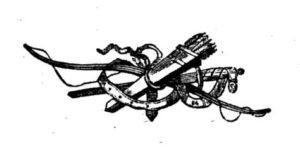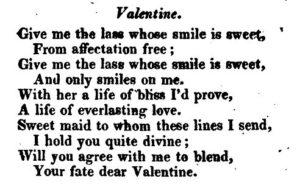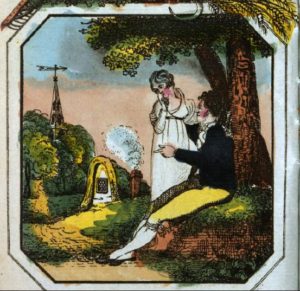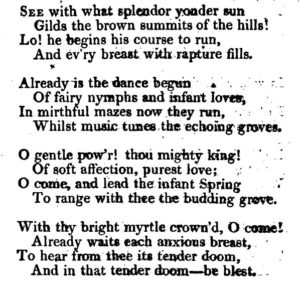“How much I adore you no language can tell !/ Like your charms, does my passion all others excel;/ O! say then, dear girl, you my fondness approve,/And consent to be mine at the altar of love.”
Valentine’s Day was celebrated by unmarried adults (and in some locations, children) during the Regency period, and in a post in this space last year (here) I talked about the types of cards and mementos that might be exchanged, including the fascinating folded “puzzle-pocket” types. I mentioned that books were available to help those who were not talented writers, so I thought we could take a peek at those this time around.
Google Books has a small collection of the poetry books that were published in Regency times to help those struggling to express themselves (search for “Valentines”). The poems, some quite good and others less so, range from passionate to scornful, deeply adoring to clearly intended as humor. The books are aimed at a rising middle class who could read and could spare a handful of pence to purchase such volumes, for the poems frequently make reference to lacking fortunes and rejection of those who are not content with a simple life. They were published by various printers, usually in London, and sold widely in bookstores, stationers, and even a toyman’s shop.
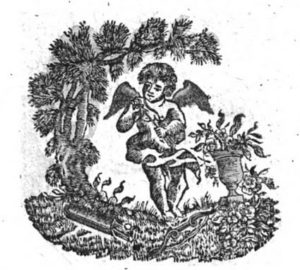 Cupid’s Annual Charter; or, St. Valentine’s Festival (“by Cupid”) “In which all true lovers have free leave to declare their sentiments to each other” was apparently published every year and sold for sixpence.
Cupid’s Annual Charter; or, St. Valentine’s Festival (“by Cupid”) “In which all true lovers have free leave to declare their sentiments to each other” was apparently published every year and sold for sixpence.
It starts with a call to action:
“Love has power life to charm /And all it’s cares and ills disarm /Hasten then to Cupid’s shrine /And each one choose a VALENTINE /Call in Hymen to your aid /Let to him your vows be paid /Thus ensure your bliss for life /And avoid the rocks of strife”
An example of the poetry:

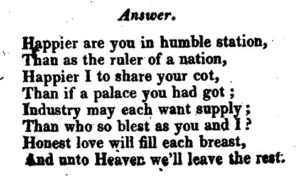 Or, how do you like this sweet little verse?
Or, how do you like this sweet little verse?
The Herald of Love; being a choice collection of Valentines and answers, etc (1801) includes an additional subtitle: “with a valentine to a waterman”! Why that particular one should be specified, I have no idea, but this fun collection includes Valentine poems written specifically for quite a number of various professions. I can’t resist sharing a few of them below, notably ones to a publican, carpenter, footman, soldier and an apothecary, plus ones from a sailor and from a draper who joined the volunteers!
Some came with instructions: “VALENTINE TO A LADY, WITH A PAINTING OF TWO HEARTS UNITED AND CROWN’D WITH ROSES.”
“Bright emblem of the budding rose, /In blooming spring that early blows; /Like her, the ravish’d sense you meet, /As fair, as innocent, and sweet. /To you your valentine commends /His suit, and this soft emblem sends. /Two hearts united here combine, /Where that the lot of yours and mine, /Sure the chaste union would be found, /By heav’n with constant blessings crown’d.”
This one amused me at the admission of INATTENTIION: Each Sunday morn with joy I rise, /And strait to church repair; /Where I behold your sparkling eyes, /My sweet angelic fair. /Tinctur’d by love I scarce conceive, / What e’er the Parson says, /As you my pensive thoughts bereave, /Whilst on your charms I gaze. /Then Oh! thou lovely, blooming maid, /Believe my heart is thine; /And thou alone can give me ease, /My charming valentine.
And this one charmed me with a tale of RIVALRY: T’other day as I was a crossing the Park, /I saw you, dear Betsy, along with a Spark; /So trim and so gay, it troubled my heart, /And this method I take, my woes to impart. /Can I hope, my dear girl, that you will be mine, /When I know I’ve a rival so graceful and fine? /But this my sweet maid, I would have you believe, /And trust me, my words are not form’d to deceive. /Tho’ in flattery and grandeur he may me excel, /Yet this I am sure, he wont love you so well; /Then answer me fairly, if you will be mine, /And give peace to the breast of your true valentine.
TO A PUBLICAN; How now, Mr. Bung-does your memory fail, /instead of good Beer, you are sure to draw Ale;/Your conduct must alter, or else from your home /You’ll be driven, and then to the workhouse must come./Your pipes are all broken, and news-papers lost, /Your bottles the same, all by laying in frost; /If your practice don’t alter I surely decline, /And never more own you for my valentine.
TO A SOLDIER: Tho’ you think yourself a soldier smart, /Don’t think your big looks will charm my heart: /Your helmet fierce, and your coat so red, /Clothe an artful heart and a stupid head; /And though you are bedeck’d so fine, /You ne’er shall be my valentine.
TO A CARPENTER: Tho’ you use such a tool as makes every thing smooth,/Yet you’re rough in your manners, and hard at heart; /Therefore I must say, all your love I refuse, /For I think it most pleasant when we are apart. /If your saws they are rough, your language is most, /To such strange manners I’ve never been used; /So with all your vain notions you’ve nothing to boast,/For it’s easy a better than you for to choose. /So take warning by this, for there’s worthy Tom Mallet, /I shall soon to the church with him trip away; /Such a goodnatur’d man would suit any one’s palate, /So good bye Mr. Surley, ’tis Valentine’s Day.
TO A FOOTMAN: Since last Valentine’s day, to my sorrow I find, /You, Thomas, have run day and night in my mind;/ You’re grown so bewitching as never before, /For I find that I love you each day more and more. /Each morning your face, with what pleasure I see, /Not my own in the glass, is so charming to me. /I’m so vex’d I could cry, when you’re out of my sight, /But when you are present my heart feels delight; /How I wish my dear Thomas, for life you were mine, /My lover, my friend, and my true valentine.
TO AN APOTHECARY: Altho’ you are a Surgeon smart, /And Apothecary call yourself; /Don’t think your big looks will charm each heart, /Many know you to be a stupid elf. /What’s worse than a conceited fop, /Whose smile is like a Monkey’s grin? /Behind your counter as you hop, /With cravat, hiding all your chin. /I hate your haughty sneering looks /Altho’ you are deck’d out so fine; /Your heart I scorn so take it hence, /For really you shall not have mine.
FROM A SAILOR: What dreadful dangers have been mine, /Since last I saw my valentine: /Tempests and storms upon the deep, /Would make thy gentle heart to weep. The fury of the foe combined, /When many a tar his breath resigned; /All these by good fate I’ve withstood, The perils of the raging flood. /Escap’d from all those various ills, /Safe is return’d, your constant Will. /Evils severe, I oft endure, /Which you will pity I am sure; /If that your love is still the same, /You’ll not delay, the day to name; /And should your love but equal mine, /I’ll bless the day of valentine.
FROM A VOLUNTEER: To be a soldier’s now the fashion, /Therefore hear me declare my passion /Dear Miss, I really hope and trust, /My red coat won’t give you disgust. /True, when my business I could mind, /I always thought that you was kind; /But since I’ve been a Volunteer, /I really think you’ve chang’d my dear. /’Tis true it brings me heavy losses, /Neglect of business, and such like crosses. /You know, when I could measure ribbons, /Muslins, Cambrics, and Irish Linens ; /My strict attention to my trade, /Made me of no rival afraid. /Now do not think that I neglect you, /I am a soldier to protect you; /And beg that you’ll your heart resign, /To me, your faithful valentine.
There are more books of this sort–you can view Love’s Preceptor or a Cabinet of choice, by “Love” (1800) in Google books, for instance–but I’ve given you a taste. What do you think? If you had lived in the Regency and were expected to hand-write poetry on a Valentine for your beloved (or someone else!), would you have been tempted to rely on a source like these?
For my part, I would love to know more about the prolific, anonymous writers who penned all these verses–who they were, how much they were paid, if they wrote other things, what their lives were like. Hah! Inspiration happens. The urge is now upon me –I think that’s all going to have to go into a story.

